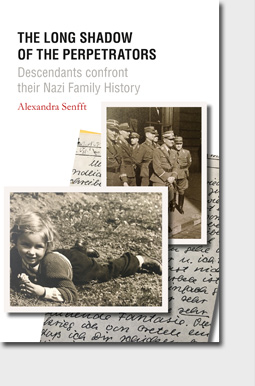
Excerpts from
The Long Shadow
of the Perpetrators
Descendants confront
their Nazi Family History
Alexandra Senfft
Language English
World Rights available
Paperback
56 pages
«Even today, the trauma of the Second World war, the still-raw crimes committed by the Nazis and the silence of those responsible are making themselves felt.»
Alexandra Senfft
During numerous events for her previous book Schweigen tut weh (Silence Hurts), Alexandra Senfft witnessed, how children and grandchildren of Nazi perpetrators break their silence: Her conversations reveal long-kept family secrets with painful emotional effects. In this book, for the first time, the silence within the families is related to other traumas that were passed on through generations. Building on research on transgenerational transmission, she illustrates in 9 moving portraits how silence became a burden. The very personal point of view helps to break the ritualised patterns of narration, reveal identification with the perpetrators and point out ambivalences. Most protagonists have come to terms with their family past and are taking an active stance against Xenophia and radical right wing. The portraits do not deal with perpetrators from the first row but with blind followers and war profiteers who, after the war, were caring mothers and fathers – but have never been held to account and could settle in their silence.
“Alexandra Senfft’s book is like an icebreaker in the frozen ocean of German families.”
STERN MAGAZINE
“Senfft analyzes the emotional mechanisms which have led to massive denial of shame and guilt.”
NEUE ZÜRICHER ZEITUNG
“The Long Shadow is a very personal book. Such publications are still necessary for the comprehension of the Nazi era and how it has impacted individuals.”
ZEITSCHRIFT FÜR GEISTESWISSENSCHAFT
“No other book shows, with such a wide spectrum, how much historical guilt in the family has shaped peoples’ existences.”
DER FREITAG
The silence of the perpetrators, non-acknowledged Nazi crimes and traumas from the Second World War are still at work. Inherited anguish has silently left its mark on many people, damaging biographies and relationships and even influencing politics. Alexandra Senfft’s journey through memory, supported by current research, tells of the burden of silence. Her book poses uncomfortable questions confronting denial: How did perpetrators come to be perverted into victims, what impact do feelings of shame and guilt have—and is there such a thing as justice? Sensitively and sagely, her book presents ways for descendants of the war generation to deal with this legacy soundly, if possible also in dialog with the descendants of the survivors. It makes remembrance mandatory in the present and for the future.
